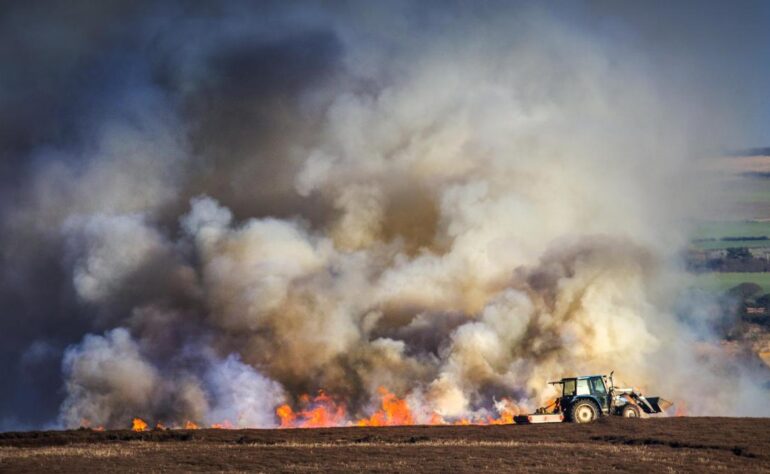As the burning season opens today thousands of fires will soon be started on the UK’s fragile peatland carbon stores – for grouse shooting.
Calls to stop swathes of the UK’s iconic heather hills from being deliberately set ablaze have intensified as the grouse moor burning season officially begins.
Between 1 October and 15 April, shooting estates controversially torch large sections of peat moors to cultivate younger, more nutritious heather for game birds to eat.
Peatlands – which have been dubbed the ‘Amazon of the UK’ by some of the country’s leading environmental experts – are the nation’s largest natural terrestrial carbon stores. However, there is scientific consensus that when these fragile environments are damaged by burning they contribute to climate change by releasing large amounts of carbon into the atmosphere.
They also perform other important roles in the ecosystem, including protecting communities from floods, maintenance of water quality and providing homes for wildlife.
Luke Steele, Executive Director of Wild Moors, says “Grouse moors continue to fan the flames of climate change by setting the nation’s carbon-rich peatlands ablaze, despite consensus that every last peatland needs to be restored to protect these important ecosystems from collapse.”
Investigations by Wild Moors, Greenpeace Unearthed and the RSPB recorded thousands of fires set on peatlands during the previous burning season (Oct 21 – April 22), many of which are suspected to have been performed unlawfully.
But the times are changing. Yorkshire Water, United Utilities and the National Trust, the three largest owners of land used for grouse shooting, now prohibit their tenants from burning following lobbying by Wild Moors.
Meanwhile, the UK government has introduced a partial ban on burning on deep peat (peat which is 40cm or greater in depth) which is located on protected land: on a site of special scientific interest (SSSI) and in a special area of conservation (SAC) or special protection area (SPA). The move follows recognition from officials that burning “makes it more difficult or impossible to restore these habitats to their natural state,” although shallow peatlands are exempt.
Scotland’s devolved government has also announced its intention to restrict the use of burning on peatlands, with legislation on grouse moor reform included in its new programme of government.
Campaigners have welcomed the progress but say more has to be done by other landowners and the government to ensure burning of peatlands is brought to a complete end.
Luke Steele adds “Today’s climate-conscience landowners object to fragile peatland being set on fire in a ritual which releases large amounts of climate-altering gases into the atmosphere, contributes to flooding in communities downstream and pollutes water supplies. That’s why Wild Moors is calling on all remaining landowners and the government to catch up by bringing grouse moor burning to a complete end.”
